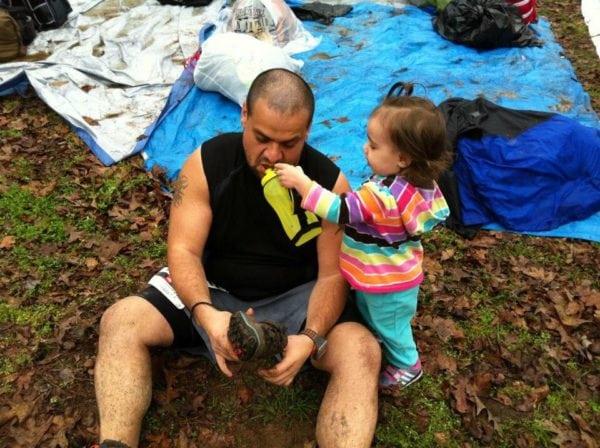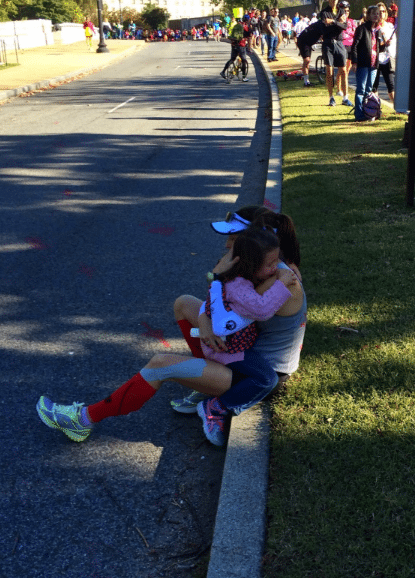[Editor’s Note: This article was ‘penned’ by the Trail Sisters’s Liza Howard.]
I was in bed after a tough day with a grouchy two year old and an impatient eight year old, scrolling mindlessly through Facebook, when I saw Jason Schlarb’s heartbroken post about his son’s reaction to his drop from UTMB last month.

Screenshot of Jason Schlarb’s Facebook page. All images courtesy of Liza Howard unless otherwise noted.
I wanted to comment: “Kids are the worst!!!”
I typed it out, but decided not to post it. I knew Jason would read the love and empathy in my words, but I wasn’t sure the rest of the kindhearted commenters would. But I meant it–as only someone could who’s had to explain multiple times to her son that winning isn’t everything.
“Mom, you’re going to win the race, right?”
“I don’t know. But the most important thing is that I try my best.”
“But you’ll win?”
“Look, honey, if I do my best and I win, that’s great. But sometimes you do your best and you don’t win. As long as you try your hardest, you’ve done what’s most important. Understand?”
“Yes. But you won’t lose, right?”
“Get yourself in the car.”
A child’s absolutist understanding of racing can be exasperating. But it’s their self-assuredness and moral clarity about DNFs that really chafes.
A painful back spasm has left you hobbled and leaning sideways. You struggle along like this for three hours before finally dropping from a race.
“My dad quit.”

Tony Constanzo not actually dropping at the Rocky Raccoon 100 Mile.
You haven’t kept any food down for hours. Even water makes you wretch. You decide not to death march the next 11 hours to the finish.
“My dad quit.”

Michael Canle feeling rotten, but not dropping at the Rocky Raccoon 100 Mile.
You got lost and are off course for two hours. Your feet are a blistered mess. It’s unlikely you’ll make the cutoffs now, so you call it a day.
“Dad gave up.”

Soon-Chul Choi at the finish of the Angeles Crest 100 Mile.
The wheels have fallen off. You’ve blown up. This is not your ‘A’ race. You decide to save your legs for your next race.
“Mom gave up.”

Dana Savage’s last 40 minute mile at the JFK 50 Mile before she dropped.
A young child’s moral code is not nuanced. Behavior is either righteous or it isn’t. Giving up is bad. You quit or you didn’t. Certainly it should be easy enough to discount your five year old’s black-and-white assessment of your decisions during an ultra, but, more often than not, it isn’t. Their questions rankle and fester. And their judgments are heartbreaking.
And that’s entirely your fault.
You read those particular bedtime stories. You coached your children in their values. Perseverance. Tenacity. Grit. You handed them their moral measuring sticks. Our children embody our own thinking. Their code is our code distilled.

Felicia Wilkerson’s daughter crying and hugging her after Felicia tells her she has to drop at the Marine Corps Marathon.
And certainly viewing your actions through a five year old’s eyes can be useful. Sitting in a camp chair at an aid station in the middle of the night, exhausted, dirty, chaffed, blistered, and stomach in full rebellion. That’s when a young child comes in handy at an ultra. Their worldview–stated or unstated–can get you on your feet.
Am I quitter?
Will I give up?
What was it Ken Chlouber said at the pre-race meeting before the Leadville Trail 100 Mile this year? “Kids don’t get grit, guts, and determination passed down in their blood,” he said. “They learn it by your example. Remember that.”
Nuance and pragmatism rarely help get you out of an aid station in the middle of the night. Absolutism and moral clarity do. Being an example does.

Traci Falbo demonstrating grits, guts, and determination while setting a world record at the 6 Days in the Dome 48-hour race. Photo: Jeffrey Genova
But the decision to drop is usually complex and never a character litmus test. And that’s when kids’ judgments change from helpful to wrenching. They force an uncomfortable cognitive dissonance on us.
You decide to drop from a race because you’ve been reduced to walking and you don’t want to walk for 30 miles. You’ve done it before and you don’t think you have anything left to learn from that kind of perseverance. It makes sense to drop. Then your awful kid demands you think in simple terms of right and wrong, should and ought.
“You can keep going, Mom. I know you can. Dig deep! Never give up! ”
Gargh! This isn’t about digging deep and giving up. I just don’t have a reason to continue. And I don’t want this to be about digging deep and giving up.
Nobody wants to deal with cognitive dissonance on top of a bellyful of gels and sports drinks.
I don’t know what my kids will remember about my running 100-mile races. Memories of pilfering junk food from the aid-station tables will surely factor prominently. One-hundred miles is still an imaginary distance in Asa’s mind, and he’d definitely be more impressed with a fast 5k. I hope they won’t have too many memories of me struggling and dropping–mostly because I’m not excited about the prospect of that kind of suffering. Honestly, though, “Mom failed.” is fine with me, as long as they can couple it with, “But she’s going to try again.” How you deal with failure in a race can provide just as much of an example of grit, guts, and determination as not failing in the first place.
Call for Comments (from Meghan)
- How do your children factor into the decisions you make in running and racing?
- Can you share something funny or thoughtful or noteworthy that your kid said to you about your hard run or a race?
- Have you ever DNFed a race while your child observed? What happened?

Felicia Wilkerson imparting words of wisdom after her drop.
